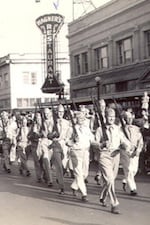The Second World War brought major changes — economic, social and demographic — to the state of Oregon. The war years also left profound impressions on the individuals who lived through them, whether in military service or on the home front. "Oregon at War" is a one-hour special that explores both the big picture and the personal stories of Oregon and Oregonians during World War II.

World War II changed the face of Oregon. The onset found Oregonians still reeling from the Great Depression. But at the war's end four years later, Oregon emerged with a thriving economy and a fast-growing urban sector. Our state had become a different place, and there'd be no turning back.
Tens of thousands of young Oregon men — many of whom had never before strayed far from hometowns — had now traveled the globe. They had seen a wider world and, in many cases, sights too horrific to describe.
Countless Oregon women had worked throughout the war at jobs once off-limits to their gender. The state now had thousands of new African-American residents. And for the first time, Hispanic workers dominated the agricultural labor force.
"Oregon At War" explores what happened during those war years through the stories of 17 Oregonians who remember them. Some of these people served in the military — an Air Force pilot from Baker City who was shot down over China; a logger from Scotts Mills who served as a medic in the bloody battles for New Guinea; a crop-science major from OSU who manned a landing craft in the invasion of Normandy; and twin brothers from Portland who both fought in the Battle of the Bulge and were both captured by the Germans.
On the home front, we meet two Portland-born Oregonians whose families were forced to leave their homes, sell their belongings and live confined behind barbed wire; a Forest Service ranger who responded to the Japanese balloon-bomb killings; a buckaroo who broke wild horses for the U.S. Army Cavalry; a woman who came to Oregon for the wartime work — and for the right to sit wherever she wanted on the bus; and another woman who, as a teenage girl in a town of young military men, jitterbugged her way through the war.
Broadcast Date: September 27, 2007